Davey Davis's Blog, page 3
July 15, 2025
Like Russian roulette in a tsunami's shadow
No shade, but I worry that my most of my readers are more prurient than curious. That you don’t subscribe to DAVID to think with me about art and culture, but for the occasional glimpse of something sexually intimate or ethically strange.
But then I hit send on a newsletter about blood or needles and bunch of you disappear. For a newsletter about sex and sensation, I lose way more followers to sadomasochism than you’d think. Churn’s not great for my bottom line, but considering this anxiety, it’s pretty reassuring.
So, to save us all some time, below the cut is an image of my mouth sewn shut, as well as a few words about the experience.
June 26, 2025
Body scan

Face: Stubble feels dismayingly unfeminine. I shave most days, wondering why I’m wasting my time and irritating my skin when I could just get laser (rather than electrolysis, in case one day I wake up yearning for that five o’clock shadow). I count among my closest friends butches and transfags whose first set of stitches came from trying to shave their faces—just like dad!—at five or six years old1, but I wasn’t that kind of kid. From a young age, I was as insistent about being a boy as I was about my party shoes, which is what my family called the fake patent leather Mary
June 23, 2025
Feeling the rush

I get everything wrong the first time I do it, which isn’t just a story I tell myself. Look at my transition: I changed my name twice (my legal and professional name is Davey, but I prefer that my friends call me David). I got top surgery twice (long story). Thanks to the pandemic, I went through my second puberty in the same house with the same people twenty years after the first one almost killed me (a longer story, which some DAVID readers may already know something about). The more important a decision is, the more likely I am to choke, then be forced to repeat it later. My dad used to compare me to a squirrel, always digging in vain for its misplaced stash of food, repenting at my leisure on all fours in the yard.
I’ve learned my lesson, even if I don’t always practice it: rush less. Over many years, this habit has made my life better, and not just because I don’t always let panic steer the ship. Taking your time with the big things really does trickle down. These days, I read more books, get in fewer arguments on social media, and pay more attention to red flags in prospective friends, lovers, and hookups1.
Which feels good, for the most part. But it does make doing some things more difficult, things that I enjoy or that strongly inform my sense of self or that just seem like what I should be doing, as someone trying to make a living as a writer in an online world. When I’m not rushing, I’m less likely to slam black coffee and shitpost; to send a mean text instead of waiting for a conversation; to invite trade who thinks a blowjob makes us boyfriend/girlfriend to my house at 1 a.m; to go to the rave or a restaurant without a mask. But as angry or unhappy or afraid as these things can make me, they’re also exciting and interesting and more likely to result in a story2. As I learn how to live between the life I have and the life I would like, to borrow from Adam Phillips, I find that I’m living less much. This is the desired result of discernment, of course, but one does miss the muchness sometimes. Can’t beat the high of finally finding that nut, as squirrels everywhere can confirm.
I want to feel special, as if every moment and action of my life is exciting and interesting and important. But I am not special, and neither are you. We are, as Phillips says, “on a par with ants and daffodils3.” So as we dwell on our “(imaginary) unlived lives,” you and I, I hope we can follow him to think as well about what the need to be special prevents us from seeing about ourselves—and what it stops us from being.
Thank you for reading and sharing my newsletter. Buy my books or find me on Twitter, Instagram, and Bluesky.
1No more straight men. Please clap!
2“But think of the story!” is a great coping mechanism, but it’s not a very good reason for doing things.
3And squirrels!
June 9, 2025
On mama's boys
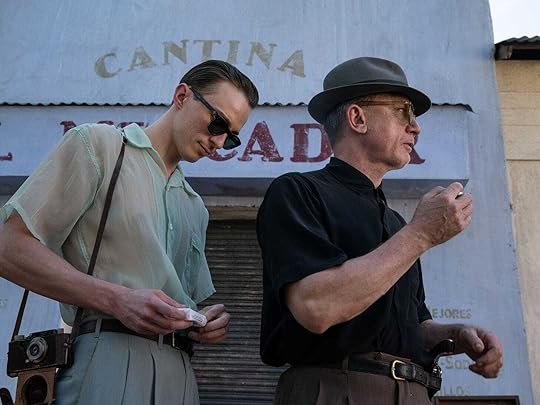
I don’t believe in rimming straight men, but Cristian was so beautiful I almost asked. 30 years old and 6’1”, with big taut arms and dark brown eyes, he was nearly hairless except for a closely trimmed beard. On one pec was IX, his lucky number; on the other, the Virgin wept over a perfect nipple. At least his other tattoos—a lopsided Greek deity, a blown-out jawbone—were humanizing. Trade is not supposed to be prettier than me! But Cristian insisted that no one noticed his looks. I’m skinny, he complained, rounding his juicy lower lip. Don’t worry, you can say it.
June 3, 2025
Pride Guide 2025 📚

This one’s about more than supporting queer writers, authors, and other artists: Trump is putting American libraries in grave danger, particularly the ones serving indigenous communities and incarcerated people. Get connected to your local library and reach out to your federal reps in the to demand that crucial funding for the Institute for Museum and Library Services (IMLS) be restored.
Essay CollectionsA twenty-something Girl Going Through It, the messy protagonist of Grace Byron’s debut novel, Herculine, has long looked up to NYC’s Hot Freelance Girls, her nickname for the trans women writers who enjoyed a brief window of upward mobility back in Obama-era Jezebel and Vice. Now, one of those women, the very non-fictional Harron Walker, has—after years of tantalizing us with profiles, interviews, and even serialized fiction—finally released her own debut (charmingly reviewed by Byron herself)1.
In Aggregated Discontent: Confessions of the Last Normal Woman, Walker’s dishy yet intellectual sense of humor is on full display with essays on a broad range of topics, from reproductive healthcare for trans people, to the artist Greer Lankton, to what it actually felt like to be one of those fabled Freelance Girls. My favorite is the unexpectedly emotional piece about her grandmother, a department store clerk who found herself helping men (alleged and otherwise) in discreet pursuit of feminine clothing that they weren’t ready or able to wear publicly. Often using personal anecdotes and pop culture as her entrée, Walker sifts the liberal marketing and fascist moral panic for real stories about people who, like her, are totally normal (!)—in the sense that they, like all of us, are deserving of curious and considered writerly attention, not propaganda.
While I haven’t yet read it, Zefyr Lisowski’s Uncanny Valley Girls: Essays on Horror, Survival, and Love is another collection to look out for. “Gripping as any horror movie,” says Rax King, Uncanny explores the complexities of gender, class, and power with readings of The Texas Chain Saw Massacre (1974), Antichrist (2009), Longlegs (2024), Ginger Snaps (2000), and more. (Devon Price, whose meticulously insightful newsletter I very much admire, is listed among Uncanny’s references.)
♡Subscribe or tip on Venmo: @Davey-Davis♡
NovelsLast year, I had the good luck to read some excellent new queer fiction, among them: the very impressive Ways and Means by Daniel Lefferts2; the brutally romantic Martyr! by Kaveh Akbar (whose Nation piece on the ICE abduction of Turkish university student Rumeysa Ozturk left me in pieces); and the hair-raising Cuckoo by Gretchen Felker-Martin, the grand-dame of trans horror3, which literally made me cry (from sadness, not fear) five or six times.
I also read excellent older queer fiction, most memorably several books by the dearly departed Gary Indiana. Gone Tomorrow, which follows an American writer to the bizarre Colombian set of his director friend’s art film, wastes no time breeding nightmares with an opening scene where an airport cop beats someone to death. Resentment: A Comedy follows another writer to Los Angeles, where he and a few other gay guys make their intoxicated orbit around the trial of two Menendez-like prep-school brothers accused of slaughtering their sadistic parents. (I am not easily shocked, and yet both Gone and Resentment presented me with sexual scenes—one consensual, one not—so challenging I could feel my own artistic ambitions heaving themselves upward, like an orca out of the ocean.) Though rivetingly told and originally constructed (especially the choral Resentment, which literally circles the trial on the city’s dizzying freeway interchanges), these tragic yet acidly funny books inspire a profound depression—beneath which boils the same impotent fury that drives Indiana’s characters to booze, drugs, risky sex, violent relationships, callous venality, professional opportunism, and generally nihilistic behavior. Indiana’s bad feelings aren’t an acute but cleansing sadness. No, they stay with you, like wet shit in the groove of your sneakers. When he died, we lost a titan of American literature and reportage, period.
Last year, Bambi got real into Alan Hollinghurst, which spurred me to read more from a writer who’s become one of my favorite authors. With its incest-adjacent age-gap gay relationships, bucolic hustlers, and jubilant SoHo raves, The Spell is by far my rompiest Hollinghurst while retaining all the hallmarks of his pristine style. Hollinghurst writes perfectly; if I taught creative writing or English lit, I’d use him as an example of a writer who follows all the rules of the King’s English to tremendous effect4. That aside, his passions for elegant architecture, beautiful men, and depictions of a very English public school (and/but also very queer) social subtext unite in his unsurpassed literary experimentation with one of his favorite themes: the art of cruising.
And two novels I haven’t read yet: Passing Through a Prairie Country by Dennis E. Staples intrigues with haunted casinos, and Hot Girls with Balls by Benedict Nguyen, a satire following two Asian-American trans women into the world of men’s pro indoor volleyball, received a starred review from Publishers Weekly.
StoriesYou know I adored Torrey Peters’ new book, Stag Dance: A Novel & Stories, which I wrote about here. You may not know that I also adored Realistic Fiction, the debut collection by Anton Solomonik, which I was thrilled to blurb:
Realistic Fiction refuses to be normal. This truly original collection of short stories delights with disorienting humor, fascinating characters, and the enthusiastic plumbing of masculinity's many mysteries, from local politics to cross-dressing to Magic: The Gathering. Low affect yet high-fidelity, Fiction is giving Thomas Bernhard meets Dennis Cooper meets, I wanna say, Robert Walser? (While we're comparing, it's rare to find short stories as tightly moving as the Borgesian "August, 1962.")
Anton is great. I love transmasculine writers and wish there were more of us! If you have recommendations, please send them my way.
Memoir & Non-FictionIt’s been a hard year. When feeling failed by cis people, I’ve found encouragement in the work of smart, brave, and creative trans writers, academics, and organizers who are applying their expertise as survivors to the $64,000 question: what could trans futures look like?
With her second memoir, Trauma Plot, Jamie Hood seeks meaning after debilitating misogynist violence5. With A Short History of Trans Misogyny, Jules Gill-Peterson asks, “How might trans women lead a coalition in the name of femininity, not to replace or even define other kinds of women, but to show what the world might look like for everyone if it were hospitable to being extra and having more than enough?” With Love in a Fucked Up World: How to Build Relationships, Hook Up, and Raise Hell, Together, Dean Spade has written the self-help book that you simply must read if you’ve ever felt that your politics were crystal-clear everywhere except in your closest relationships. Are you always attracted to people who are “bad” for you? Has anyone ever told you that you’re terrible with conflict? Do you pride yourself on your boundaries, yet never seem to get ahold of the intimacy you crave? Are you polyamorous but struggle with jealousy? Has a betrayal by a friend, a lover, or even your entire community made you feel like you’ll never trust again? READ THIS BOOK.
PoetryEven though Nes and I arrived early to the Poetry Project event for Essex Hemphill’s Love Is a Dangerous Word: Selected Poems (edited by John Keene and Robert F. Reid-Pharr), we ended up sitting on the floor against the back wall, leaning against each other. We listened to readings uproarious and tender from late poet’s family, friends, and mentees, then watched a projected video recording of the poet himself reading “Cordon Negro” and other poems a few short years before his death. Through my tears, I jotted this down: “Consider hatred / to be this: / the absence of everything.”6
NewslettersFor funny, informative, real slices of gay life, you can’t get much better than Maddy Court’s newsletter, TV Dinner. Subscribe for her advice column, stick around for her observations about books, movies, food, and the trials and tribulations of fostering incontinent puppies. Lately, she’s been sharing fun facts about Shakers, the eighteenth-century religious sect that went extinct in large part because they believed in celibacy (Fact: they thought shortcuts were morally wrong! Fact: they invented condensed milk! ).
TV Dinner is such a treat. I happily subscribe to a lot of newsletters, but there are few of them that I always read, every time, no matter what.
Thank you for reading and sharing my newsletter. Buy my books or find me on Twitter, Instagram, and Bluesky.
After a cop murdered Rodney Hinton Jr.’s teenage son, Hinton allegedly took action. Get a free month of subscriber-only DAVID content when you screenshot your donation of any amount to his legal fund.
1Not every writer or book I will be recommending in this newsletter is queer, but I loathe “LGBTQIA” and its variants for most use cases. Like, at my job I can call myself “LGBT,” which functionally means nothing, but not “fag,” which is what I actually am? My first instinct was to use “gay,” which is my preferred shorthand for non-cishet (another clunker) life and culture, but “queer” is probably the more popular solution to categorizations of this kind.
2Read my review here.
3Read my review here.
4As an essentially monolingual person (I can get around with some high school Spanish, but I’m not winning any Scrabble games), I have no choice but to love English with my whole heart. Reading widely in my mother tongue and in translation, studying grammar, and exposing myself to other art forms has, I hope, taught me to appreciate its strengths without chauvinism, its weaknesses with compassion, and its role in Anglophone colonialisms with perspective, if not forgiveness.
5Read my review here.
6“Evil positions itself on the side of right and necessity. Pain is the enemy, regardless of its form. This constitutes the absolute logic of evil: the right to claim dominion, to name, locate, and eliminate the source of the world’s pain. In this case, Israelis here and Palestinians there; in other cases, it is other sources. The list is endless. No category is immune.”—“On Representations of Evil,” by Donald Moss
May 29, 2025
Fuck it. I'll take a risk.
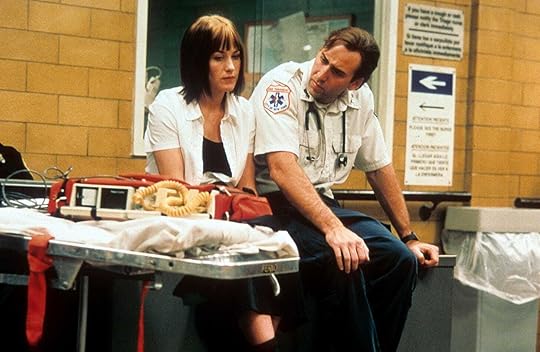
When I enter the hospital, the street’s piss and gasoline vapors are sealed out by a rotating glass cylinder that looks like a hamster wheel tipped on its side. At the front desk, the shovel-faced security guard emanates a spiky cologne with head notes of licking a nine-volt battery on a dare. He prints my driver’s license on a sticker and hands it over before waving me through what I think is a metal detector, though it’s never turned on. As I apply the sticker to my t-shirt, another security guard points at the elevators. I ride up with two nurses, women I reflexively think of as middle-aged and yet who could easily be in their thirties, like me. They smell both clean and contaminated, as healthcare workers tend to, embowered in bleach, talcum powder, rubbing alcohol, peppermint gum, blue razz vapes. At the sixth floor, the elevator bursts open, sucking like an airlock. In rushes the almost oleaginous odor of the public American medical facility: fried food, farts, and the uncanny lemon-and-lavender tang of Fabuloso.
♡Subscribe or tip on Venmo: @Davey-Davis♡
I’m here to visit my neighbor Robert, who I brought in last week. Robert is a shy but friendly man who lives on the street outside our apartment; Jade and I have gotten to know him since I moved in last year. Lately I’ve been looking forward to summer on his behalf. This past winter, no matter how cold it got—and it got fucking cold, especially for homeless New Yorkers, whose numbers have more than doubled since 2022—Robert politely refused our offer to sleep in the vestibule at the bottom of our stairwell. He didn’t want to impose, and it was clear that experience had taught him that suffering was smarter than trusting. Our compromise was a camping chair that Nes found on Facebook Marketplace and a stack of blankets that we put out at night and took in the next day.
But over the past few weeks, I noticed Robert having more and more difficulty walking. Only a month or so ago, when he joined me while I ran some errands, he kept up easily—though I had to prevent him from walking into traffic sometimes—while we chatted about space travel and how Greenpoint used to be a nice neighborhood1. Now he wasn’t even leaving the block, sticking to a recently emptied storefront two doors down from ours. His dirty clothes became filthy and his spot was surrounded by garbage, neither of which Robert would normally permit, being painfully aware of what that can mean for someone in his position, especially in a bourgie neighborhood like ours. When I asked him about his legs, he waved me off or started stringing words together in a way I couldn’t understand. While this is how Robert talks most of the time, I’ve learned that he just so happens to become less coherent when he doesn’t want to discuss a given topic. In any case, he insists on not being a burden, especially to those he considers his friends.
On Thursday morning, I came outside to find Robert yelling, in his heavy Brooklyn accent, at nobody, which is something I’ve only seen him do at night, when the street is mostly empty. I went back upstairs and made him some coffee—black, like he likes it—and returned to stand with him for a while. Red in the face, he ranted and raved at a spot a little past my right shoulder, leaning on an iron fence for support. You know I don’t mean you, he once interrupted himself to clarify, before diving back into his tirade. Fuckers think you can do this to me when I tell you the truth and you ask yourselves how is it that a man such as this is looking you in the face from out here, right or wrong, and you lie to yourselves while you lick your knives…
Later that afternoon, after he’d calmed down, I asked Robert if we should go to urgent care. Fuck it, he said, I’ll take a risk. The nearest CityMD is a ten-minute walk away, but he would never make it on foot, so I called a car. He smoked a cigarette while we waited for it to arrive, then asked me to hold onto the rest of his pack and his life savings, a couple of five-dollar bills wetly wadded into the shape of a fist.
At CityMD, the doctor urged us to go to the emergency room, and not just because it’s the only place where Robert, who doesn’t have an ID or anything to pay with, can’t legally be turned away. It turned out that he had a very serious infection in both his feet and needed to be examined by a wound specialist immediately.
I held out as long as I could, Robert kept apologizing. I ordered another car.
♡Subscribe or tip on Venmo: @Davey-Davis♡
After our apartment building burned down when I was seven years old, my mom baked dozens of chocolate-chip cookies for the firefighters, who had done their best2. This memory came to me when the ER admitted Robert right away thanks to the CityMD doctor, who had told us how to lie in order to make his condition seem as serious as possible. I wished I could go back in time to hug her. But looking at Robert’s bare feet, which resembled rancid beef jerky that had been crushed by an anvil, I wondered how much we’d really needed to grease the wheels. Did someone light them on fire? Robert asked, peering down at himself from the top of his stretcher.
I stayed with Robert in the ER, translating his story for the intake team and explaining to a series of confused RNs and doctors what I meant when I said neighbor. I didn’t want to overemphasize his homelessness, in case it led to a poorer quality of care, or even to him getting booted before he had gotten the medical attention he needed. But because I had given him a change of clothes, and because I was there with him, it took them a while to figure out what had gone wrong in the first place. Only later did I realize that some of the clinicians had initially assumed they were looking at the results of extreme neglect—which wasn’t true, at least in the sense they were thinking. You know, it might be exposure, one doctor finally muttered to another, using a bare finger press down on the white-rimmed ulcer splashed across Robert’s hairless shin. An unhoused man with a housed companion of indeterminate gender was clearly not on their bingo card3.
It wasn’t on ours, either. Robert was afraid and so was I, although I was also relaxed by the ER’s unceasing movement and by the alert boredom of its young, racially diverse staff—men and women with tense, affectless faces, tight-fitting scrubs, and extreme My parents yelled at/ignored me vibes. Not me getting turned on, I thought, fussing with the strings on Robert’s gown. He asked me to stay with him, but visiting hours were almost over. I assured him I would be back in the morning. You promise? But morphine was already dulling his pleas.
For the past week, I’ve gone to see Robert for an hour or two every day. When we’re not talking, looking at newspapers, or watching TV, I’m trying to piece together the story of his diagnosis, which was delayed by the holiday weekend. A friend connected me with another friend who’s been in a similar situation, and she shared what she knew about medical social workers, housing vouchers, psych evals, healthcare proxies, and ways I could help Robert, who’s leery of going to a rehabilitation and nursing facility to continue healing, without violating his autonomy. I’m trying to change his mind about that. If he gets discharged—or leaves early, against doctor’s orders—how will he heal his infection? After the doctor told Robert he had gangrene, I told him I was worried for his health. Well, I’m worried about freedom, he replied.
While I haven’t spend much time in hospitals and ERs, I feel at home anywhere sick, old, disabled, and mentally ill people are crammed together on the cheap. Robert’s nurses and doctors quickly came to recognize his only visitor. They are kind, or at least professional, calling him baby, bringing him treats, and answering my questions so I can make a plan to support him, whatever happens next. They are also unkind and unprofessional, telling Robert to be grateful that someone is willing to help him, chastising him for doing this to himself, implying that he does street drugs (he isn’t currently using, though this is of course besides the point), making snide jokes about him being “schizo,” and not bothering to hide their frustration when he puts up the least resistance to going to one of the city’s homeless shelters, which are so horrible he would rather die than return. I already know how to maintain a sort of cognitive dissonance about the abusive people that you rely on. This is American healthcare, especially for the sick, old, disabled, and mentally ill: patients who can’t afford better are deprived of almost every livable option except the oversight of overwhelmed, underpaid, and mightily exploited workers shoehorned into circumstances that make abuse inevitable, from doctors to medical assistants to social workers and all the way down to me, the housed acquaintance who could, at any time, invite Robert into their home (and not just their vestibule), but won’t.
When I enter the hospital room, Robert cries out, My friend! and shakes my hand. He can’t seem to believe that I always come back and tells me he prays to god that I will. When I met him, I didn’t want to be his friend. Helpful, sure, but not his friend. Maybe if I had been pushier about his feet, this wouldn’t have gotten out of control and we could have remained neighbors. Now Robert may need more than a neighbor, especially if he’s permanently disabled. (And anyway, if you’ve cried with someone, I think that’s grounds for something like friendship, at least.) I’m alone! I have nobody! This is what Robert yelled on Thursday morning while I stood beside him with his cup of coffee, waiting for him to get it out of his system. I could have contradicted him, but with what? I care about you, but I won’t blow up my life for you. What kind of care is that? I’ve given him cash. I’ve washed his clothes. I’ve helped him pee. I’ve touched his shoulder while doctors told him scary things. I’ve listened, bored and annoyed, as he invents religions and spins out on conspiracy theories (Is someone trying to kill me? he sometimes asks. No, no one here wants to hurt you, I reassure him, though we both know that this isn’t precisely true). I’ve brought him Kinder eggs and orange juice. My girlfriend and boyfriend bring him gifts, my friends ask how he’s feeling. It’s not enough. I’ve offered Robert my help, but I fear he’s not in a reality where he can receive it.
Jade said that I started talking to Robert more when her cat, our beloved Marcus, died in November. You always need a little guy, she said.
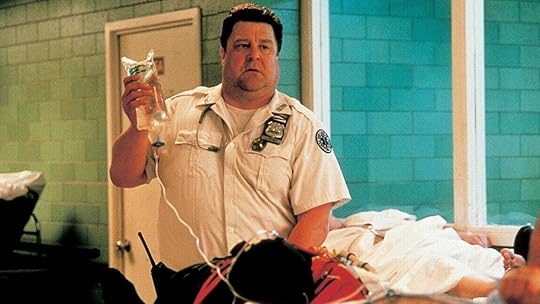
I’m ending this newsletter with additional reading on homeless Americans and homelessness in America. It’s hardly exhaustive, just the first few pieces that came to mind. If you have any to recommend—especially if it’s written by someone who is or has been homeless or unhoused, as some of these are—please add it in the comments.
“The Invisible Man” by Patrick Fealey
“Four Men” by William T. Vollmann
“California's homeless crisis could be Gavin Newsom's political albatross” by Alicia Victoria Lozano
“A Climate Dystopia in Northern California” by Naomi Klein
“Getting the House” by Cheryl Rivera
“Forced Alternatives with Tracy Rosenthal” on the Death Panel podcast
Thank you for reading and sharing my newsletter. Buy my books or find me on Twitter, Instagram, and Bluesky.
Thank you also to my paid subscribers and tippers, who help me continue to write this mostly-free newsletter while paying my rent.
1I can never tell if Robert is referring to gentrification or to the mysterious street gangs that he believes are around every corner. In terms of the threats they pose, I guess it doesn’t really make much of a difference.
2I’ve come to realize that this was most likely my mom trying to find herself a man. This fallen apple can hardly blame her.
3As an androgynous transsexual, I am my context. Everyone in the ER assumed I was a woman, in part, I think, because I was serving as a caretaker for a man.
May 18, 2025
What I've been reading and watching
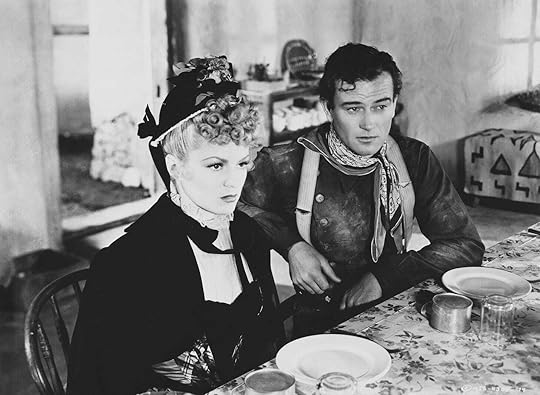 What I’ve been reading
What I’ve been readingLast week, Jade told a friend that I’m going through a “French peasant” phase. “Which book was that again?” she later asked me.
Had she meant John Berger’s Pig Earth (or even the author’s English turn in the photojournal-esque A Fortunate Man: The Story of a Country Doctor)? Or was she referring to my more recent obsession with the tremendous Jean Giono, whose Song of the World changed my life, and whose Ennemonde (sensual, aphoristic tales of a fat, beautiful matriarch and her machinations for pleasure and freedom), The Open Road (while the Melville aficionado’s American influences rise to the top like cream, Giono’s affection for Steinbeck is especially apparent in this picaresque about an itinerant smart-aleck with a homoerotic fixation on a con-man), and A King Alone (what if David’s favorite Provençal novelist took a mid-century swerve into the noir with a blood-chilling chronique about a rural serial killer?) are currently rewiring my brain—no less because I’m reading the genre-expansive1 writer through a series of translators?
It’s not escape that I find in these books, nor do I believe that their authors, the great Marxist and the unwavering pacifist, would wish to provide it for me. But there is comfort in their reverence for and solidarity with what Berger called “the so-called ‘backward,’ whether they live in villages or have been forced to emigrate to a metropolis.” As the Trump administration dismantles the fed, decimates public health, and deports refugees, migrants, and citizens to Bukele’s concentration camps; as trans rights here and in Europe are under attack and even regressing; as war, famine, and nuclear uncertainty endanger and immiserate people the world over; and as, most horrifically of all, the Nakba enters its 78th year with what may have been Gaza’s deadliest night since October 2023, we will need this comfort.
To read novels is not enough, but if you can read novels, too, I think you should. I’ll conclude with a passage from Ennemonde: “The New Testament agrees with no one; the Old Testament with some people, sometimes; but what accords with everyone is the sense (which has no name in any language) that nothing is dust.”
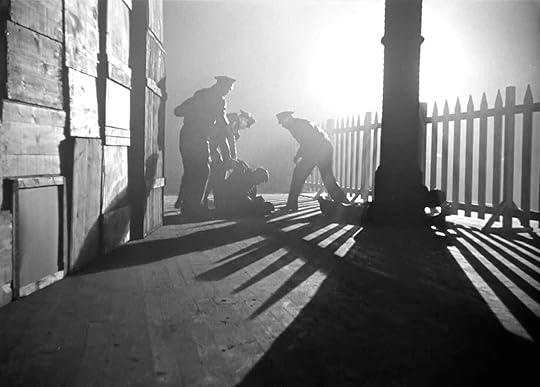 What I’ve been watching
What I’ve been watchingIn my dad’s house when I was growing up, our holy trinity was Jesus Christ, Ronald Reagan, and John Wayne (not necessarily in that order).
For this reason, returning to John Ford as an adult is like receiving a dream meant for someone else: it’s hard to know what’s their memory, what’s mine, and what’s been gleaned by both of us from the cultural ether, the soup of art, politics, and propaganda. Perhaps you’ve had a similar experience after seeing a film that’s been legendary your whole life, as I did with Citizen Kane (1941), Casablanca (1942), and now Stagecoach (1939), one of the most influential Westerns ever made. As Roger Ebert wrote, “Seen today, Stagecoach may not seem very original. That’s because it influenced countless later movies in which a mixed bag of characters are thrown together by chance and forced to survive an ordeal.”2
It’s with great regret that I report that the young John Wayne, a man I eventually learned enough about to loathe, is achingly beautiful. As Ringo Kid, a gentlemanly outlaw that’s long, lean, and squinting3, with a Silent Era star’s soft lips and labile smirks, Ford’s muse idiosyncratically pre-empts his vowels in that way so perfectly parodied by Robin Williams in The Birdcage (1996). I suppose it’s impossible to speak of the Ark Movie (as Ebert calls it) without summoning its imitators and iterations, which applies as much to Stagecoach’s now-iconic story and stars as it does its setting in Tsé Biiʼ Ndzisgaii, the sacred Navajo valley that has, thanks to Ford, since become the visual shorthand for cowboys, Indians, and Manifest Destiny in the American West4. Everything’s a palimpsest, even the originals.
Like Stagecoach, much of which takes place in the stagecoach itself, The Long Voyage Home (1940) is a chamber piece by contrast, with the action occasionally boiling over from innards of a sailing ship to decks, wharves, and pubs. Cinematographically, the tramp steamer’s belly produces ingenious fish-eyes and other claustrophobic perspectives. Even better, Ford is careful to change the lighting according to the weather and time of day, with an effect so realistic as to be eerie, and yet too beautiful for waking life. I’m thinking of the crepuscular bridge, its helm and doorways misting with lamplight as the SS Glencairn drifts into World War II, its sailors certain they’ll be drawn into battle and die as “unsung heroes.”

In keeping with this month’s black-and-white theme, I’ll share two more recent viewings, both of them rewatches for me:
The sublimely phosphorescent The Night of the Hunter (1955), with Jade. We were struck by the abstract simplicity of the set pieces, which were designed by Hilyard Brown to evoke the tunnel-vision perspective of children.
Fellini’s final black-and-white film, 8 ½, with Nes; though the director famously identified himself as a liar, his psychological honesty—which is ultimately, I think, a loyalty to the child he once was—is my favorite thing about him.
Thank you for reading and sharing my newsletter. Buy my books or find me on Twitter, Instagram, and Bluesky.
After a cop murdered Rodney Hinton Jr.’s teenage son, Hinton allegedly took action. Get a free month of subscriber-only DAVID content when you screenshot your donation of any amount to his legal fund.
1Sorry.
2You can go ahead and disregard his defenses of Ford and Wayne as “not racist.” Get real.
3“My dear, you’ve set your gaze upon the quintessential frontier type. Note the lean silhouette, eyes closed by the sun, though sharp as a hawk. He’s got the look of both predator and prey.”
4In her episode about John Ford, You Must Remember This’ Karina Longworth gets into the racism of Stagecoach and other Ford Westerns, particularly regarding the Irish-American director’s depictions of Native Americans, and the complicated relationships early Hollywood’s Indigenous actors and crew members had with Ford and other white settler filmmakers.
May 14, 2025
So we talked about nothing
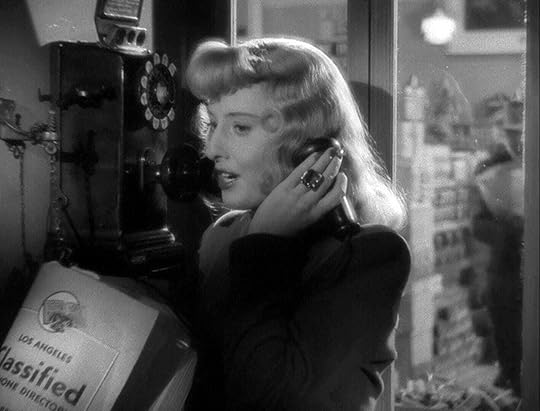
When she called, she didn’t greet me with her mouth full of food as she sometimes does, clearly relishing the minor social transgression. She didn’t try to put someone else on—one of her po-faced roommates, hollering from across the room, or a sullenly pithy staffer—then demand to know if this stranger and I knew each other. She didn’t talk over me, her favorite habit.
These are all things that I might hang up on her for, and have, and will again, I’m sure. But last night she was unusually present, if performatively sniffly. She had obviously been yelling at or with someone, and wanted me to know it. When I asked what was wrong, however, she said she didn’t want to talk about it, which was also unusual.
May 6, 2025
Some sensory experiences
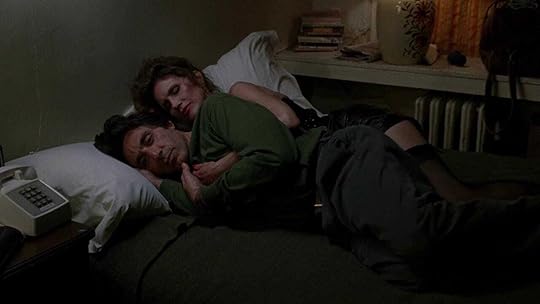
Since his address was in Williamsburg, and since he was a white gay man whose photos had all been taken in a locker room, I assumed he would live in one of those hideous high-rises with the cardboard walls and airport toilets and on-site doggy daycare. But though it was only a few steps from the Google store, Drew’s building was old and shabby, as was the apartment he shared with an indeterminate number of other people. Dim, spacious, and strewn with ancient bric-a-brac—Disney’s Ursula vamped on a light switch; dusty artificial vines framed doorways hung with quilts; ironic postcards lined the seams of crumbling corners and open cabinets—it reminded me of the many high-turnover, hand-me-down leases where I’ve lived, sucked, and fucked my way from West Oakland to New Orleans.
His bedroom was too small to be as messy as it was, but his rent was only $800; I congratulated him on his luck. Though we were still dressed, he invited me to sit on his rumpled bedspread, where I avoided eye contact with the cluttered dresser, the closetless rack of clothes, and the standing mirror pitted with, one can only hope, the human body’s natural adhesives: spit, pus, flecks of dried toothpaste. While we chatted, I daydreamed about filling a series of big plastic garbage bags and joyfully carting them to the nearest landfill. There’s nothing more ordering than absence.
It’s shallow, I know, to be turned off by slobs, but I did like Drew, a polite and mild-mannered lawyer around my age. He wasn’t bad-looking, either: big eyes, strong nose, weak hairline, with an upper body that was overdeveloped in proportion to his long, slender legs. In person, he was more effeminate and deferential than his messages suggested. I felt two ways about this—safe and sexless—which is really only one, now that I think about it.
Drew’s tongue was nauseatingly frictionless, but I liked how his face felt in the crook of my neck, awakening my hair follicles and flushing my skin. He wasn’t wearing underwear beneath his jeans, which while not unexpected is a sensory experience I try not to think about. If I don’t wear something under denim, myself, I feel distressingly dirty; I don’t know how gay guys do it. As I had already confirmed, his cock was nice, rising quickly and easily to a respectable length and girth. I went down there as soon as possible, eager for the distractions of old reliable.
He talked to me, stroking my hair, and I began to relax. But when he reached down into my pants, his fingers went immediately to my asshole. Well, shit, I thought. Flattered as I was, gender-wise, by his homosexual instincts, I knew their next stop would be my pussy, even my clit, and the specter of a UTI ruined the mood I was in the process of summoning. The effort of stopping, negotiating, sending him to wash his hands, starting it up all over again—it just wasn’t worth it. I sucked his cock for a few minutes longer, trying to ascertain, by his sounds and shifting tumescences, what gave him true pleasure and what was merely encouragement or good manners, and then I stood up, apologized, put my shirt back on, and left.
I haven’t really been fucking strangers lately. Most men are only as dangerous as you allow them be, but I’ve gotten tired of knowing what happens if you give them an inch; I wish I didn’t, but I do. At the same time, rapidly enshittifying hookup apps seem to have gotten straighter and more violent—especially since January—while my ginger experiments with the men-seeking-men section of Tinder have proven, again, that I’m too trans for dating among normal people. Drew was an anomaly, the fluke alignment of opportunity, hormones, psychosexual conflict, and a paradoxically motivating apathy. It’s for this reason that, despite its interruption, our encounter felt like a success to me, the first I’ve had in months: nothing bad happened, which these days I don’t take for granted.
Thank you for reading and sharing my newsletter. Buy my books or find me on Twitter, Instagram, and Bluesky.
Get a free month of subscriber-only DAVID content when you screenshot your donation of any amount to political prisoner Ángel, a butch lesbian, community organizer, and 2020 uprising defendant who is currently in ICE custody. She will not fight hir deportation to Chile, where she has not lived since the age of 7, but will need money to rebuild hir life from scratch. You can also send money directly to Loba-Cabrona on Venmo or $PunkWolfe2 on Cashapp.
April 28, 2025
(the) gay trauma convention(s)

Can you imagine expressing your sexuality in public without having to look over your shoulder? Because America has brutally commodified most of its commons, the majority of us cannot, save for in rarefied spaces where cash has temporarily suspended the forcefields of the moral panics that bestride us1. If I personally am to even have the option of this kind of normalcy among cis people, I must pay for it. What’s more, the cis must be of the resolutely not-normal sort.
This weekend, I went to IMsLBB—which I cheekily referred to as the gay trauma convention over on Twitter, but which is more like Spring Break for perverts—where attendees dress, socialize, and fuck as animals; get fisted on motorcycles; carefully drown their lovers; host salons to discuss the pros and cons of moistening one’s cigar on a stranger’s asshole; sexually identify as sixteen, eight, or two years old while having been born during the Carter administration; become aroused by the sound of
Davey Davis's Blog
- Davey Davis's profile
- 56 followers



